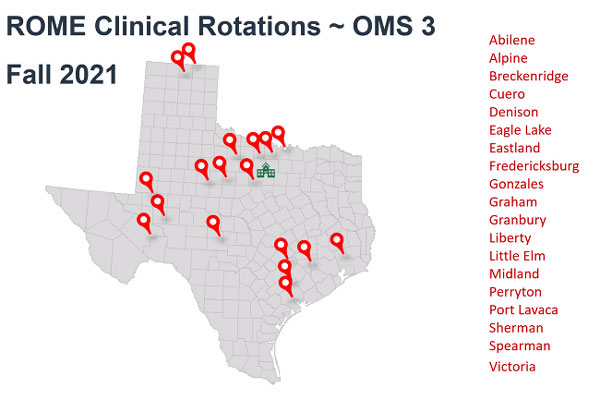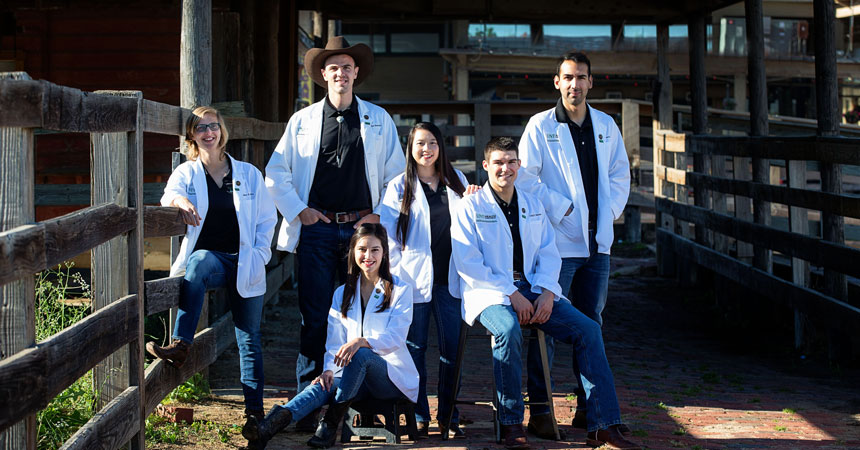TCOM’s ROME Program takes the spotlight at TMA meeting on access to health care
The gold standard for rural osteopathic medical education, the Texas College of Osteopathic Medicine’s ROME program was on display at a recent meeting of the Texas Medical Association on Physician Distribution and Health Care Access.
Assistant Dean for Rural Medical Education John Gibson, MD, made a presentation about all facets of the ROME program and the benefits rural communities are seeing.
“I love talking about the ROME program,” said Dr. Gibson as he began. “This program was founded by Dr. John Bowling many years ago, and he cultivated many aspects of the curriculum that really got us into a great position. We are very proud of our rankings from primary care and the placing of graduates after residency into rural areas.”
Dr. Robert Emmick, Chair of the TMA Committee on Physician Distribution and Health Care Access, praised TCOM’s ROME program and the efforts made to address the rural health care shortage across Texas.
ROME students are selected to the program in their first-year at TCOM, and it is very competitive.
“We have more apply than we can take each year,” said Dr. Gibson. “We try and choose students who have a strong desire to serve in rural underserved communities, and even some global locations.”
Once accepted into the ROME program, students undergo vigorous training, so they are prepared to do more when they begin their rotations in rural communities at the start of their third year in medical school.
“We feel like exposing students early to patients that have medical needs enhances their ability to be adaptable, which they will have to be in rural areas,” said Dr. Gibson. “We have simulated exams that are above and beyond what we do with the regular medical students that helps bring them along faster.” 
When ROME students begin their rotations, typically they are in a one-on-one situation with their preceptor and getting hands on experience on a daily basis. While doing an OBGYN rotation, it is not uncommon for a ROME student to deliver up to 10 babies during that rotation.
The ROME program and TCOM have added Point of Care Ultrasound technology. The technology allows students to hold the equipment in their hands, plug it into an iPhone to see images in real time.
Dr. Gibson has developed this health care tool into a course that can earn a micro-credential for TCOM students and providers across the region. ROME students were an integral part in developing this course.
The international component and opportunities that ROME students get were also topics addressed by Dr. Gibson. TCOM has sent students to Russia, Malawi, Guatemala, and Thailand for rotations. TCOM leadership and faculty hope to revive those international opportunities once the pandemic subsides.
“It’s a little different practicing on dirt floors and in bamboo shacks, but we absolutely love it,” Dr. Gibson said.
ROME students are also very active in presenting academic research. Three students have presented at the World Congress of Family Medicine this past year while other students have given presentations to an audience halfway across the world. There are no boundaries for the ROME program.
Dr. Gibson took many questions from the TMA panel, who were overwhelmingly impressed by what TCOM has developed. They were also impressed at how the program is also being implemented in underserved communities.
“We are so proud of what we have here at TCOM and our ROME program,” said Dr. Gibson. “The students are passionate about addressing the crisis in our rural communities and we are here to give them the tools to do so.”




![Uyen Sa Nguyen Scaled[58]](https://www.unthsc.edu/newsroom/wp-content/uploads/sites/16/Uyen-Sa-Nguyen-scaled58-145x175.jpg)

Social media